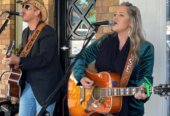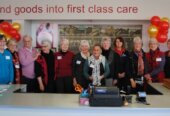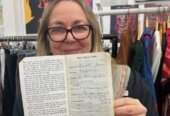When conducting family history research, preserving one’s ‘perishables’ is paramount, says the Te Awamutu Genealogy Group.
The group described ‘perishables’ as the people in your family who are likely to die soon, during their family history workshop on Saturday.
“Once they’re gone, they’re gone,” said member Sandra Metcalfe.

Te Awamutu Genealogy Group members Sandra Metcalfe, Avis Steed, Katherine Donald, and Christine Ball. Photo: Benjamin Wilson
Because of New Zealand’s privacy laws, birth information less than 100 years old cannot be publicly accessed, for marriages it is 80 years, and if someone died before they turned 80, their death certificate is only publicly available after 50 years.
“You really need to get back three to four generations before you can get access to online resources that can help you,” said Metcalfe.
“That is why it is really important to talk to the living first, to talk to your ancestors, your parents, grandparents, aunts and uncles, anyone who is still around who knows a little bit about your family history. They’re the ones who are going to help you leapfrog the whole privacy situation in New Zealand.”
Metcalfe said people are likely to inherit photographs without names on them, and it is important for the people who are still living to get the chance to look at those photos and help identify the people in them.
“Your immediate ancestors, they’re the ones to start with, branch out from there… There is nothing worse than having a lovely photo without knowing who’s in it,” said genealogy member Christine Ball, who started her genealogy journey in 2008.
“The internet has grown so much since then, it is quite exciting, but if you look at the ancestry ads, it makes it look very easy; it is not actually that easy. What you have to do is start with yourself and start with the information that you know,” she said.
“There is a heck of a lot of information available on the internet, but it is only about 10 per cent of what is really out there. You’re not going to find everything online, you’re going to have to do some groundwork first,” said Metcalfe.
In addition to taking advantage of living assets, the genealogy group said it is equally important that family information and photographs be preserved for future generations.
Because documents and photos tend to deteriorate, Ball said the best way to preserve it is to have it digitised.
The ability to read older technology like floppy disks is also disappearing, so backing up data and staying up to date with relevant digital formats is also important, Metcalfe said.
“Genealogy gives you a really good excuse to keep up with your computer skills,” said Ball.
Today (Thursday) was the last day of Family History Month, but the genealogy group will have another free workshop that will focus on DNA and hands on internet research on Saturday.








